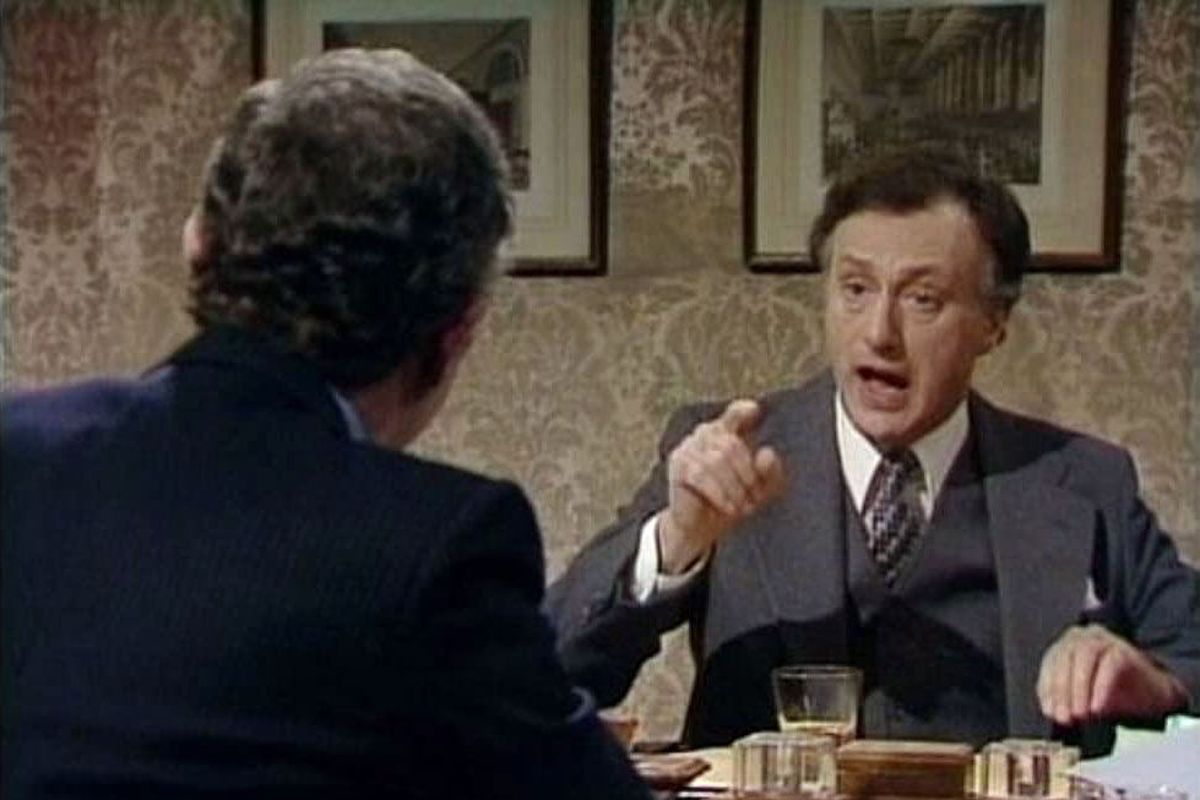Before ‘Veep,’ there was ‘Yes Minister’

With voting deadlines on the horizon and politics generally raining on parades, escaping it all seems alternately impossible or irresponsible since, according to politicians on both sides of the aisle, we’re about to experience the “most important election of our lifetime.”
But, instead of doom-scrolling, as is my usual custom, I’ve taken to watching videos about British parliamentary procedure, prime ministerial “question times” from decades past and as much political satire as I can consume.
When it comes to political satire in television, HBO’s “Veep” or Netflix’s “House of Cards” might spring to mind first for American audiences, but across the pond and in my heart, the BBC’s “Yes Minister” takes the cake.
It first aired in 1980, and for a show that consists primarily of middle-aged men in suits talking about the driest aspects of democracy, its popularity might be surprising.
There’s no sex, no action, barely any swearing, and quite a few of the jokes are about grammar – English, Latin and Greek.
“On paper, it’s a complete dud,” show creator Jonathan Lynn said in a documentary about “Yes Minister” filmed in 2004.
Nevertheless, it was a hit and still ranks among the best of British sitcoms, Armando Iannucci, the creator of “Veep” and “The Thick of It,” said in the same documentary.
The pilot episode begins at the tail end of a general election. The incumbent party loses the election to the opposition, of which Jim Hacker MP (Paul Eddington) is a member. Much like in “Veep,” the opposing parties’ real-life affiliations are never stated outright.
The new prime minister offers Hacker the position of minister of Administrative Affairs. He enthusiastically accepts, then sets off to take charge of the department with a head full of ideas for slashing at government bureaucracy and creating “open government.”
But when he meets his permanent secretary, Sir Humphrey Appleby (Sir Nigel Hawthorne), and his principal private secretary, Bernard Woolley (Derek Fowlds), Hacker slowly begins to realize just how monumental a task he has set himself.
“Vain, bombastic, obsessed with the press and his popularity and nursing a Churchill fetish, Jim Hacker still managed to be the only MP we’ve ever genuinely liked,” Iannucci said.
While the show was, of course, fictional, it was no secret that the show’s writers, Antony Jay and Jonathan Lynn, based every episode on anecdotes and information gathered directly from civil servants at the very highest levels of the day’s government.
As the show explains it, the role of ministers in the British government is to make policy decisions; the role of the civil service is to put the resulting policies into practice.
But, according to the show, ministers were at that time drafting policies based almost exclusively on civil service advice. So, at the end of the day, policy was being created and carried out not by elected leaders but by faceless civil servants.
“It’s about who governs Britain,” Lynn said in the same documentary. “What we did was reveal to the public what was already widely known in government circles.”
Ironically, one of the show’s biggest fans was Margaret Thatcher, the prime minister at the time. Thatcher liked it so much that she wrote her own sketch and strong-armed the left-leaning cast into performing it with her in front of a live audience in 1984.
“Yes Minister” gave the British people an uncommon insight into their government because it also was a masterclass in the art of spin and deceit in the world of politics, a subject notably still at the forefront of this year’s political discourse.
“Today, if an MP starts to sound like a character from ‘Yes Minister,’ they’re pretty much dead in the water,” Iannucci said.
In “Big Brother,” the fourth episode of the first season, a BBC journalist asks Hacker about the government’s plans for creating a national database of personal dossiers on British citizens and how that database will be used.
“Yes, I’m glad you asked me that question because it’s a question a lot of people are asking,” Hacker says. “And why? Because a lot of people want to know the answer to it. And let’s be quite clear about this without beating around the bush, the plain fact of the matter is that it’s a very important question indeed, and people have a right to know.”
“Minister, we haven’t yet had the answer,” the journalist says.
“I’m sorry, what was the question?”
The essence of the show is summarized rather neatly in the character of the minister’s permanent secretary.
“(‘Yes Minister’) was about being duplicitous while remaining thoroughly charming,” Iannucci said. “And it’s most charming and duplicitous character was Sir Humphrey Appleby.”
As you watch the pilot episode, you quickly realize what it takes the minister most of the season to grasp, that for all of his apparent deference, Sir Humphrey is the one calling all the shots. And, as far as Sir Humphrey is concerned, the aim of government is to make sure that nothing happens and that the people know nothing about the “nothing” that is happening.
Forty years ago, before the show first aired on BBC2, “British politics was still a closed world,” Iannucci said. “We knew who the movers and shakers were, but not exactly how they moved and shook.”
The BBC broadcasted parliamentary sessions on the radio so voters could hear some of what their elected leaders were up to, but they had no concept of the breadth of civil service influence, that is, “the backroom boys were still faceless.”
What little the British people knew of the day-to-day operation of their government they saw, as it were, through a glass, darkly. But with “Yes Minister” and its sequel “Yes Prime Minister,” the fog began to clear.
“Yes Minister” and “Yes Prime Minister” are available on YouTube and Apple TV.